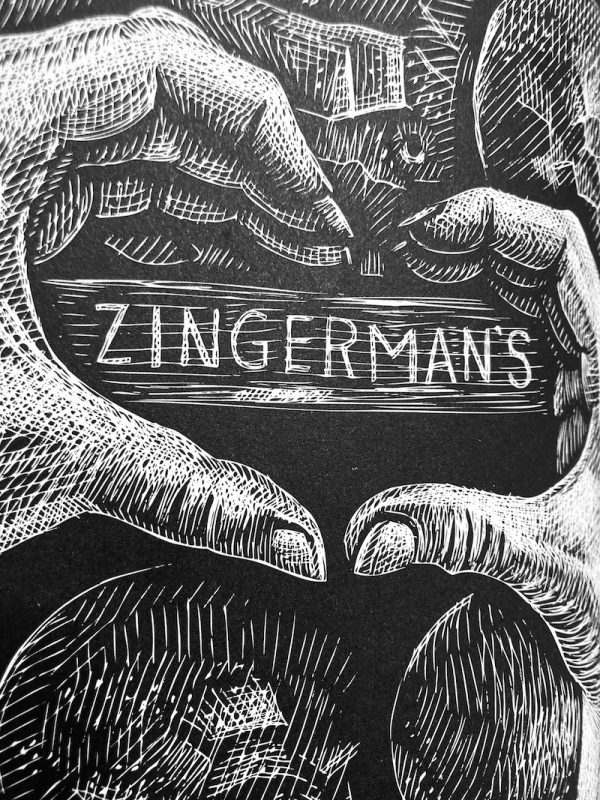Love and Work
Why it’s worth showing love and care in all our actions

Way back in 1990—in the same year that the two Germanies were reunited, Nelson Mandela was released from prison, and eight years after Paul and I had opened the Deli—my friend Lex Alexander from North Carolina told me about a new book he was reading. And loving. It was written by a guy from Iowa who Lex had met a few years earlier at a food show. His name was Jim Autry, and his new publication was entitled Love and Profit: The Art of Caring Leadership. Autry put forward some fairly radical perspectives that were way outside the thinking of the mainstream management world at the time. Like Robert Greenleaf’s Servant Leadership and Peter Block’s Stewardship, Autry’s book had a big impact on us. “Good management,” Autry wrote, “is largely a matter of love.”
Love has been around as long as there have been human beings. We all want it. And we all have some sense of what it’s about, flawed though that sense may be, in many cases, from our families and personal relationships. Every religion advocates it—you will each, I’m sure, be able to cite the relevant sources in your own sphere of spiritual activity. What I am sharing here is less about love in the general sense of the word (and the world), and instead more narrowly focused on what Jim Autry was advocating—a look at how love fits into, and can be an essential part of, where we go to work every week.
If we’re fortunate—and I feel like I am—love is already there. I’ve been doing a lot of writing, as many of you know, over the last five or six years on a model of organizations as ecosystems. Part of what I’m loving about the work on it is that every few weeks or so I think of some new element that makes the model more meaningful and useful. Here’s one of my latest additions to the model:
When we create a healthy organizational ecosystem, love is the outcome.
While we ought to bring love to all we do as individuals, my belief is that the collective health of an organizational community will be felt, first and foremost, in the form of love. No, love is not what we sell, nor is what we use to pay our bills. But it is present, in both the energy we emit and the actions we take—imperfectly, of course—every day. In a healthy ecosystem of any sort, the value of the whole will always exceed the sum of the individual parts. Love (along with creativity and positive energy) will be a big part of what raises that collective value to such great heights—it’s what elevates the ecosystem beyond what each component would accomplish on its own. Love certainly isn’t all we need, but when all our needs are being met in a healthy, humble, and human way, I believe love is what we’ll get.
bell hooks’ book All About Love; New Visions, is an essential read on the subject. She has much to share and many important—and challenging—social questions to ask. One of the biggest takeaways I got from her writing is that love is not just something we feel—it’s an action. A verb. Love is what we do every day with every person we interact with, every sandwich we make, every bread we bake, and every email we send. It’s not just something we feel when we’re in the right space or in the mood, and it’s not just an ideal to aspire to. It’s a decision we make about how we’re going to show up with coworkers, customers, and vendors. And no matter how well we brought love on any given day, we’re never done doing it. As Grace Lee Boggs once said, “Love isn’t about what we did yesterday; it’s about what we do today and tomorrow and the day after.”
What is love about in the workplace? I’ll suggest love in action looks like caring compassion; it’s present when we make the decision to choose positive beliefs; it shows up when we help each other to feel seen and heard and supported and to be ourselves. It’s being able to address antipathy and anger, but in caring, dignified, and constructive ways. bell hooks shares six characteristics of love: “affection, respect, recognition, commitment, trust, and care.” I’m not sure we’ll end up with those exact six here at Zingerman’s when we set about one day to define better what we do, but they’re a great start.
Whatever formal definition of love we eventually end up with down the road, I’ve come to believe that love is both an input to the organizational ecosystem—i.e., something we can each do at work every day—and an output—it’s what we’ll get when we have a healthy (and still imperfect) organization. It’s what emerges when we create “good work.” In this context love is, by definition, a collective effort. As Thomas Merton wrote, “Love is our true destiny. We do not find the meaning of life by ourselves alone—we find it with another.” I believe you can feel it in the air. Or at least in our energy.
This understanding hit me hard, in the best possible way, when I was reading Humberto Maturana’s Biology of Love. The Chilean biologist and philosopher states very firmly:
Love is our natural condition… We humans are loving animals, and our intelligence and creativity in the domain of human well-being depends on our being loving animals.
If we stay grounded in who we really are as humans, and treat each other with dignity every day, we won’t have to work at it that hard. Love is what will then emerge from the ecosystem.
The problems start to pop up when organizations do the opposite. Where “bad work” is the norm, you will find very little love in action. Where disrespect is the (dis)order of the day, where exclusion is accepted, where dignity is reserved for only a select few, when people have no sense of purpose, or little hope… money may still be made, but love becomes a lost cause. In the workplace, this looks like people being treated like machine parts or being dehumanized, disrespected, or dishonored. It’s being talked down to while told to get back to work. It’s being isolated, away from any meaningful impact your work may have. It’s doing work one could care less about to earn the paycheck one badly needs to pay the bills. It’s where, as bell hooks writes, “Relationships are treated like Dixie cups. They are the same. They are disposable. If it does not work, drop it, throw it away, get another.” (Certainly, there are amazing individuals, exceptions in their ecosystem, who will act with love no matter where they’re working.)
We have allowed all these issues to occur to some degree over our years in business. Good intentions don’t guarantee good results, nor will they preclude problems. But humble reengagement and deep care for others through our efforts to treat everyone with dignity, and honor who they are, means love will still be intact despite our imperfections. Even in a loving organizational ecosystem, challenges will still abound. Money may be tight, personal and interpersonal tensions intrude on effectiveness, outside forces complicate our work, and our own anxieties limit our ability to lead. We all fall short, and we all will, at some point, be mad at each other. We will still, unfortunately, fire people. But we can find ways to address all of those from a loving, supportive place. We can find ways to breathe deep and stick together through the struggle, to take a long walk (alone, or together, or both) to reground and gather ourselves; to figure out how to still make sustainable finance a reality even under duress. We can approach all those things with love, care and compassion. And when we fall short, we can acknowledge the error of our ways and humbly work to make things better. I’ve come to believe it’s our obligation to do that. As Emma Goldman said, “The most vital right is the right to love and be loved.”
Vivek Murthy is a man who’s quietly working to influence the country in a more mindful, loving direction. I met Dr. Murthy when he called, and then came out to Ann Arbor, to interview a few of us here for his newly-released book Together; The Healing Power of Human Connection in a Sometimes Lonely World. Since his visit, I’ve listened to a series of interviews with him. When I heard the podcast with Tim Ferriss in May during the early months of the pandemic, I lamented the fact that he was no longer the Surgeon General. His calm, wise, caring humility seemed so in line with the kind of work we’re trying to do here. Patience pays off. Dr. Murthy will again, as of January 20th, be the surgeon general. He brings alive a lot of what I’ve been thinking and feeling about this subject over the last few years:
I think it is so important for us as a society to be able to talk not just about emotions but about love, because love is the greatest source of strength that we have. I, as a doctor, have written many prescriptions for powerful medicines and antibiotics, but there is no medicine that’s more powerful than love and you don’t need a medical degree or to be a nurse to be able to deliver the power of love to other people’s lives. What you need is the very human and universal ability to respect and be in touch with your emotions, to summon what’s already inside you. And that’s the power of love.
Regardless of what stage of life we’re at, we’ve got three basic needs: we all want to know that we matter, we want to be seen for who we are, and we want to know that we’re loved.
Building on bell hooks’ belief that love is an action to be taken, I’ve come to realize that it’s also, as Jim Autry wrote all those years ago, perfectly practical. It’s better business. Making a living with love is a much better way to go. It can help us turn tension into creative upside; antipathy into aspiration; care into quality. And per Dr. Murthy’s comments, creating a loving workplace could be helping keep us healthy. One advantage we have here in making that a reality is that love has been in our mission statement—at Paul’s creative and caring suggestion—that we penned shortly after Jim Autry’s book came out.
We share the Zingerman’s Experience
Selling food that makes you happy
Giving service that makes you smile
In passionate pursuit of our mission
Showing love and care in all our actions
To enrich as many lives as we possibly can
Since we actively believe and teach that it is all of our work at Zingerman’s—starting with me and Paul—to make that Mission a reality in every single interaction we have with every single person we come into contact with, I’m realizing now as I write that acting in a loving and caring way has already been a performance expectation here for us for 30 years now. To build on three decades of that Mission work, we’ve committed ourselves to working hard to make this a reality. In the twelfth and last section of the new 2032 Vision, we wrote:
Love and Care
Every act in the ZCoB is an act of love. Acts to care and connect. To take the implementation of our mission to greater heights than ever. We view everyone through the lens of a compassionate heart, choosing patience, positive beliefs and take pause to appreciate the beauty in everyone and everything we work with. We are mindfully conscious of what the impact of our decisions are on the people we work with, our customers, and the larger community. We understand that the energy we put into every interaction is essential. We are self-reflective and intentional in our work in this way.
Compassion is a deep understanding of the feelings and experiences of others. Working in this way allows us to demonstrate care, and genuine care for others creates real connections. It makes us authentic. These authentic connections create trust, cooperation, and eagerness/willingness to work together. We lead with compassion.
How does this look if disagreements or frustrations arise today? We engage and interact with each other to come from a place of love, knowing that welcoming the discomfort can be the key to our growth and better understanding of each other and ourselves. We first assume positive intent in our engagement. We have caring interactions even when we disagree—feeling heard, and having courageous conversations without contempt. We work to change our beliefs to see how people change and grow, supporting them on their path. We share this journey together.
We will fall short, I know, every day. But just as we do when we fall short in service we give or food that we serve, we’ll take a deep breath and lovingly, caringly, and compassionately go forward.
A little love here in the ZCoB won’t by itself solve all the world’s problems, but it can help. Gary Snyder suggested we need to create “communities of love.” As leaders in our organizations, I believe we have the chance to work to help those communities to become a reality. The healthier we make our organizational ecosystems, the more we can make love the kind of everyday reality that Jim Autry, bell hooks, Emma Goldman, Humberto Maturana, Vivek Murthy and so many others have all written about, the greater the chances are that we can change our worlds for the better. As we wind down 2020 and move through the threshold into a new calendar year, we can use that work, I believe, more than ever. Because as anarchist Ashanti Alston once said, “We have to find ways to love and support each other through tough times.”
The work of creating good work and a healthy organizational ecosystem is detailed throughout Parts 1-4 of the Zingerman’s Guide to Good Leading series. You can get the whole bundle for $100 at the Deli, Roadhouse, or Coffee Company (yes, we can put books in your carryout order) or online at Zingerman’s Press, ZingTrain, and Mail Order.




Zingerman’s Art for Sale